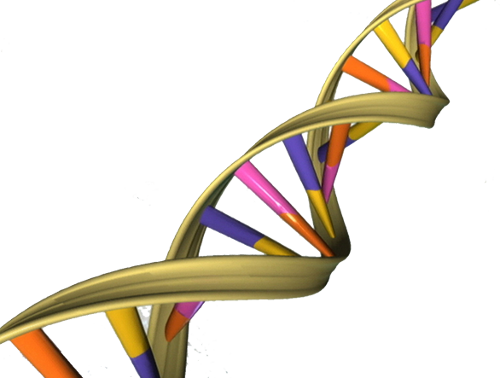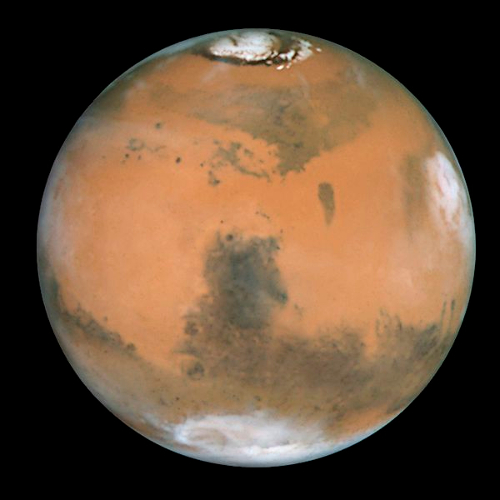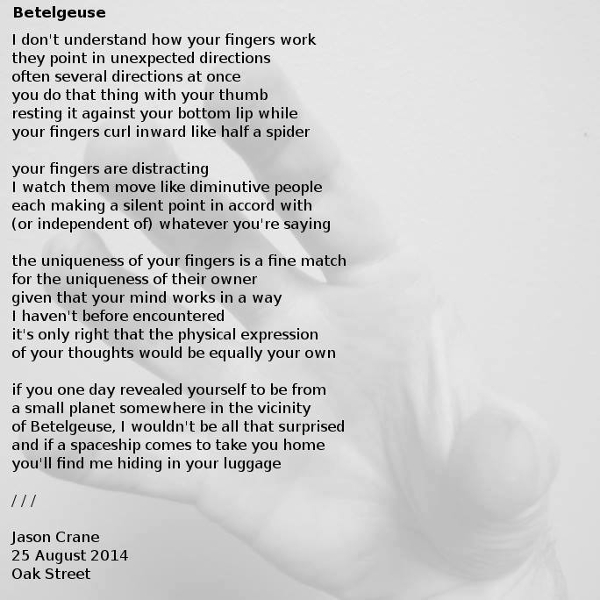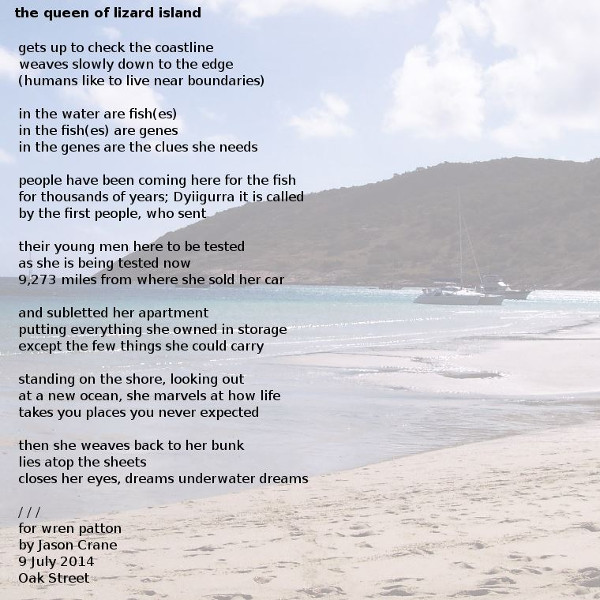Another Eclipse Poem
I’m trying to write
a fancy poem
about eclipses
and love and long odds.
I’m trying to obscure
the details,
change the names
to protect the innocent.
But you shine
through every line,
and no amount of
obfuscation
can cover up
your brilliance.
It leaks around
the edges of the dark,
seeps into the corners.
I don’t need special glasses,
but sometimes I still
cover my eyes.
/ / /
8 April 2024
Charlottesville VA
NaNoWriMo Day 8
Category: Science
Describing A Satellite
For the Earth,
both hands in an arc.
A fist for the moon.
Gravity a rope,
unseen in the dark.
Palms up for the tides,
both high and low,
the hands raise and lower
as they ebb and flow.
The planet spins,
the pull taunts,
the moon is what
the water wants.
/ / /
20 September 2023
Charlottesville VA
Escape Velocity
I was really into astronomy
in the way I’m into most things:
intensely for a while and then not.
You bought me a series of astronomy classes
that took place at the local science center.
I went, but I didn’t have a telescope,
or even binoculars. Honestly
I’m not sure I even went to all of them.
After the first class it became clear that
I could look, but I couldn’t go.
Somehow that made it worse.
/ / /
13 August 2023
Charlottesville VA
This is poem 23 in a series called 50 Days Till 50 Years. I’m writing a poem a day between now and my 50th birthday. I’m going to try to focus on memories of my past, and the people who inhabited it.
Leave a CommentNinety Seconds
Today the folks in lab coats
moved the doomsday clock,
or is it Doomsday Clock,
anyway they moved it to
90 seconds to midnight,
but luckily my life is set
to Doomsday Saving Time
so I have an extra hour
in which to watch
the rest of you go boom;
but don’t worry,
I’ll be right behind you.
/ / /
10 April 2023
Charlottesville VA
unified field theory
to watch a hummingbird
poke its long snout
into a fake flower
in search of sugar water
is to understand the universe
///
Jason Crane
28 July 2018
Canandaigua NY

particle & wave
peel back the flesh over the sternum, then slowly separate the ribs
there in the center is the light, both particle & wave
the light will spill into the room, but that’s to be expected
reach your hands into the chest cavity
it’s often best to do this part with your eyes closed
the fingertips are more sensitive than sight
as you press your fingers inward, you should feel
the hard edge of a jewel, concealed there in the light
were your eyes open you’d be unable to see it
your fingers, though, find it easily, willingly, hungrily
withdraw this jewel from the cavity & open your eyes
in the facets of the jewel there are universes reflected
some are worlds like this one, but with subtle changes
others are strange lands unlike any conceived of by the human mind
behind these worlds, at the very center of the jewel
is the home of the light; it sits in a perfectly spherical room
never flickering, never dimming, both particle & wave
knowing this is inside of you, what is beyond your grasp?
/ / /
Jason Crane
6 February 2018
Pittsburgh PA

biology
I will never write
a more beautiful poem
than the one created
by your DNA
/ / /
29 January 2014
Oak Street
Thomas Dolby-She Blinded Me With Science
Why I’m A “Science Guy”
Today a friend asked me (after learning that I’m an atheist), “So you’re a science guy?” I’ve been asked some form of this question often enough that it’s probably time to say something about it in a public forum.
I should begin by saying that I’m not even sure I understand the question. It seems to mean, “So you believe only in things for which there is evidence?” Or maybe, “So you don’t believe in things for which there is no evidence?” Or some combination of the two. And I’d have to unreservedly answer yes to both questions.
I’ve read many times that a “belief” in science is just another form of faith. And here I have to disagree. At least as I understand faith, it literally means a belief in something despite the absence of evidence. The very essence of faith in God, for example, is that one does not require proof of God’s existence. Science, at least as I understand the term, is the exact opposite. The scientific method is the process of hypothesizing something and then testing that hypothesis. If the data supports the idea, it’s accepted. If not, another explanation must be found. And as we amass more data, we may realize we were wrong about a previous idea (e.g. there’s nothing smaller than an atom). This doesn’t invalidate the method, just the previous results. In fact, it proves that the method works.
“OK, smart guy, so what existed before the Big Bang?” I don’t know. I think “I don’t know” is one of the most powerful phrases in the English language. When I was a union organizer, we were taught to always answer “I don’t know, but I’ll find out and get back to you” if a worker asked us a question to which we didn’t know the answer. This builds trust by demonstrating intellectual honesty. It’s important to realize that “I don’t know” is not at all the same as “nobody knows.” It’s also important to realize that “nobody knows” is not at all the same as “nobody can know or will ever know.” If you’d asked me in 1750 what makes the sun bright, I wouldn’t have been able to tell you. And if my answer had been “magic” or “God,” I’d have been dead wrong, as we now know. My inability – or the inability of modern science – to explain something doesn’t mean it can’t be explained or that we need to turn to the supernatural for an explanation.
“OK, smart guy, how do you explain that [this thing happened to me that I can’t explain]?” I understand why this is so powerful. Maybe you thought of someone for the first time in years, only to have your phone ring and to hear their voice on the other end. Or you dreamed of a friend, only to learn that they died during the night. Or a disease went away when it seemed like there was no hope. I can completely understand why anyone, faced with one of these circumstances, would believe that more was at work than just the natural world. But is that really the case?
In the case of the first two examples (the phone call and the dream), these things seem special when viewed against the backdrop of one person’s life. But there are 7 billion people on Earth, and surely given those numbers, multiple people a day must have this experience. It just stands to reason that every once in a while someone is going to call a friend who was just thinking of them. Or someone is going to dream about someone who just died. When it happens to you, the individual case seems special, but that’s just because it’s rare in your experience, not rare in the experience of humanity, taken as a whole.
My explanation for the third example (disappearing disease) is similar. Given the number of people alive right now, it must happen that sometimes diseases for which we have no treatment, or for which treatment has failed, just go away. The body figures out how to fight them or the disease itself loses some key component of its survival. Again, our lack of an explanation doesn’t mean no explanation is possible.
That leads me to an important idea, namely that in these situations, it’s useful to ask the question, “Which is more likely, that science and I can’t currently explain why this happened, or that the answer exists outside the laws of nature?” In other words, “Is it more likely that I happened to be one of the 7 billion people who received a coincidental phone call, or that God or some supernatural force caused my friend to call?” If the latter seems plausible to you, then we probably have a difference in perception of the world so great that it can’t be overcome. I understand that and I’m not trying to convert, just to explain.
I’d also like to mention the selective acceptance of science. For example, politicians will go on television, radio and the internet to gainsay evolution or global warming. In other words, they’ll use tools that exist only because of science to argue against the application of that very same scientific method to an issue with which they don’t agree. I understand that in this particular example, their disagreement is just as likely to be strategic as real. So let’s go back to one of the examples above. In the case of the disease, if you accept the existence of electricity in the hospital and all the medicine that was used up to the point where the disease disappeared and the gasoline engine in the ambulance that got your friend to the hospital, etc. etc., how do you determine where to draw the line? “Science works for this and this and this but not this” – why not? How do you know? Where’s your evidence?
Finally, I’d like to add a personal note about where we’re at as a culture. I’m speaking here as an American in the 21st century. It makes me very sad to live in a country where we even have to have the concept of being “a science guy.” The validity of the scientific method and what it’s produced has so much data to support it that if we can’t accept that, we really can’t accept anything. If we’re to have any hope of saving the human race from destruction (see: global warming), we have to get past this idea that we can choose which bits of science we accept. We’ve pushed our planet and our species to the brink. We don’t have time for magic.
Leave a Comment
Mission: T Minus 12 Hours
they’re letting me take so little
a photograph (no frame)
an e-reader (into which
no new books will ever be placed)
the rest is in my head
there were so many questions
over all the months
they tried to get all the way in
uncover little seeds of doubt
or dissatisfaction that might
bloom in the Martian desert
I let them in, mostly
but I kept one thing just for myself
buried it as deep as I could
because I wanted this chance
and I knew they’d never let me go
if they knew
5 July 2013
Auburn, AL
/ / /
Starting on July 4, 2013, I’m writing a series of poems from the point of view of an astronaut traveling on a one-way mission to Mars. These poems were inspired by this podcast by the appropriately named Roman Mars. His show 99% Invisible is fabulous.
Leave a Commentthe stars in Grand Central
the stars in Grand Central
are reversed on the ceiling
as if painted by aliens
from a distant galaxy
or by the hand
of an omnipotent God
or, more likely, by painters
who set the star map on the floor
rather than holding it above
their heads as intended
Grand Central is for traveling
to the Hudson Valley, to Connecticut
without meaning to, the painters
added another destination
millions of miles away
25 January 2013
Auburn, AL
/ / /
Leave a CommentThe Entire Sweep Of Human History, Reduced For Easy Consumption To One Tiny Facet Of Evolutionary Biology, Made Easily Digestible By The Removal Of Context And Detail, Served In A White Clam Sauce Over Linguine Noodles, With A Glass Of Red Wine, All For $17.50
this is
the story
of trillions
of sperm
and the
eggs who
loved them
3 April 2012
Brooklyn, NY
/ / /
![]()
It’s National Poetry Writing Month! A poem a day, each day in April.
Listen to these poems using the player above.
/ / /
salty dream
awaken to the chime
…sit
/ / /
deoxy-
ribonucleic acid:
me



